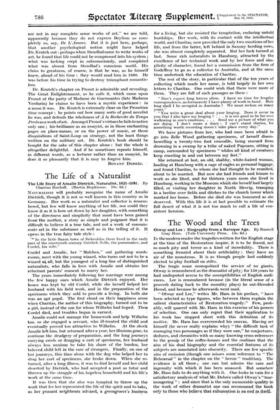The Wood and the Trees
IN the modern reader the tragedies written for the English stage at the time of the Restoration inspire, it is to be feared, not so much pity and terror as a kind of incredulity. There is something frenzied about their artificiality : they have an air of the monstrous. It is as though people had suddenly elected to play football on stilts.
The tragic muse monopolized the service of no giants. Otway is remembered as the dramatist of pity; for 150 years he had undisputed access to the susceptibilities of English audi- ences. Lee is remembered because (in the literal sense of a proverb dating back to the morality plays) he out-Heroded Herod, and because he afterwards went mad.
" Otway and Lee," writes Mr. Ham in his preface, " have been selected as type figures, who between them explain the salient characteristics of Restoration tragedy." Few, prob- ably, will quarrel with Mr. Ham in this exercise of his powers of selection. One can only regret that their application to his work has stopped short with this definition of its motive. Mr. Ham has overcrowded his canvas. Having set himself (he never really explains why) " the difficult task of managing two personages as if they were one," he conjectures, 'deduces, and chronicles with so many knowing cross-references to the gossip of the coffee-houses and the coulisses that the aim of his dual biography and the essential features of its subjects are annotated into obscurity. There are few specific sins of omission (though one misses some 'reference to " The Rehearsal " in the chapter on the " heroic " tradition). The evidence is all there ; one can but admire the care and ingenuity with which it has been amassed. But somehow Mr. Ham fails to do anything with it. One looks in vain for a satisfactory analysis of what Mr. Dobree called Otway's "tear- mongering " : and since that is the only memorable quality in the work of either dramatist one can recommend the book only to .those who believe that exhumation is an end in itself.


















































 Previous page
Previous page